- Home
- V. S. Naipaul
The Mystic Masseur Page 9
The Mystic Masseur Read online
Page 9
‘Sure, sure. But, look, before we go any farther just show me the type you going to print the book in.’
It was Times. Ganesh groaned.
‘Is the best we have.’
‘Well, all right,’ Ganesh said, without enthusiasm. ‘Another thing. I want my picture, in the front.’
‘We don’t make blocks here, but I could fix that up. Extra twelve dollars.’
‘For one little little picture?’
‘A dollar a square inch.’
‘Is expensive, man.’
‘You expect other people to pay for your picture? Well, that settle. Altogether – but wait, how much copies you want?’
‘A thousand in the beginning. But I don’t want you to break up the type. You never know what could happen.’
Basdeo didn’t look impressed. ‘Thousand copies,’ he mumbled abstractedly, working away at his calculations on the back of the handbill. ‘Hundred and twenty-five dollars.’ And he flung down his pencil on the table.
So the process began, the thrilling, tedious, discouraging, exhilarating process of making a book. Ganesh worked with Beharry on the proofs, and they both marvelled at the way the words looked so different in print.
‘They look so powerful,’ Beharry said.
Suruj Mooma could never get over it.
At last the book was completed and it was Ganesh’s joy to bring home the thousand copies in a taxi. Before he left San Fernando he told Basdeo, ‘Remember now, keep the type set up. You never know how fast the book go sell, and I don’t want Trinidad bawling for the book when I ain’t have any left.’
‘Sure,’ Basdeo said. ‘Sure. They want ‘em, you want ‘em, I print ‘em. Sure thing, man.’
Though Ganesh’s joy was great there was one disappointment he couldn’t quite stifle. His book looked so small. It had no more than thirty pages, thirty small pages; and it was so thin nothing could be printed on the spine.
‘Is this boy Basdeo,’ Ganesh explained to Beharry. ‘All the big talk he give me about point and leading, and after all that he not only give me that ugly type he call Times, but he had to give me small small type.’
Suruj Mooma said, ‘He make the book look like nothing, man.’
‘Is the trouble with Indians in Trinidad,’ Beharry said.
‘All of them not like Suruj Poopa, you know,’ Suruj Mooma interrupted. ‘Suruj Poopa want to see you get on.’
Beharry went on, ‘You know, Ganesh, it wouldn’t surprise if somebody did pay this boy Basdeo to do what he do to your book. Now, another printer who didn’t jealous you woulda make the book run to sixty pages and he woulda give you thick thick paper too.’
‘Anyway, you mustn’t mind,’ Suruj Mooma said. ‘Is something. Is a damn lot more than most people do in this place.’
Beharry pointed to the frontispiece and nibbled. ‘Is a nice picture of you here, you know, Ganesh.’
‘He look like a real professor,’ Suruj Mooma said. ‘So serious, and with his hand under his chin like if he thinking real deep.’
Ganesh took another copy and pointed to the dedication page. ‘I think Suruj Poopa name look nice in print too,’ he said to Suruj Mooma.
Beharry nibbled in embarrassment. ‘Nah. You only making joke, man.’
‘I think the whole thing look nice,’ Suruj Mooma said.
Early one Sunday afternoon Leela was standing at the window of the kitchen at the back of Ramlogan’s shop in Fourways. She was washing the midday dishes and was about to throw some dirty water out of the window when she saw a face appear below her. The face was familiar, but the impish smile on it was new.
‘Leela!’ the face whispered.
‘Oh – is you. What you doing here?’
‘I come back for you, girl.’
‘Go away quick march from here, you hear, before I throw this tureen of dirty water all over your face and wash away the grin.’
‘Leela, is not only come I come for you; but I have something to tell you, and I want to tell you first.’
‘Say it quick. But I must say you was able to keep it to yourself a damn long time. Eh, eh, is nearly three months now you drive me away from your house and in all that time you never bother to send a message to ask me, “Dog, how you is?” or “Cat, how you is?” So why for you come now, eh?’
‘But, Leela, is you who leave me. I couldn’t send you a message because I was writing.’
‘Go and tell that to Beharry, you hear. Look, I go call Pa in a minute and what he have for you ain’t nice, I could tell you.’
The smile on the face became more impish, and the whisper was more conspiratorial. ‘Leela, I write a book.’
She trembled on the brink of belief. ‘You lying.’
He produced it with a flourish. ‘Look at the book. And look here at my name, and look here at my picture, and look here at all these words I write with my own hand. They print now, but you know I just sit down at the table in the front-room and write them on ordinary paper with a ordinary pencil.’
‘Oh, man! Oh, man! Oh, man, you really write the book.’
‘Careful! Don’t touch it with your soapy hand.’
‘Look, I go run and tell Pa.’ She turned and went inside. Ganesh heard her saying, ‘And we must let Soomintra know. She wouldn’t like it at all at all.’
Left alone under the window in the shade of the tamarind tree, Ganesh began to hum and take a minute interest in Ramlogan’s back yard, though he really saw nothing, neither the copper cask, rusted and empty, nor the barrels of water full of mosquito larvae.
‘Sahib!’ Ramlogan’s voice rasping from within. ‘Sahib! Come inside, man, sahib. Why you pretending that you is a stranger and standing up outside? Come in, sahib, come in, sit down in your old place in the hammock. Oh, sahib, is a real honour. I too too proud of you.’
Ganesh sat in the hammock which was now, once again, made from a sugar-sack. The Chinese calendars had disappeared from the walls which looked mildewed and dingy as before.
Ramlogan was passing his fat hairy hands over the cover, and he smiled until his cheeks almost covered his eyes. ‘The book smooth smooth,’ he said. ‘Look, Leela, feel how smooth it is. And the print on the cover, man. It look as if, sahib, is really part of the paper. Oh, sahib, you make me really proud today. Remember, Leela, was just last Christmas I was telling you and Soomintra that Ganesh was the radical in the family. Is my opinion that every family should have a radical in it.’
‘Is just the beginning,’ Ganesh said.
‘Leela,’ Ramlogan said, with mock severity. ‘Girl, your husband come all the way from Fuente Grove and you ain’t even ask him if he hungry or if he thirsty?’
‘I ain’t hungry and I ain’t thirsty,’ Ganesh said.
Leela looked miserable. ‘All the rice finish, and the dal that remain over not much really.’
‘Open a tin of salmon,’ Ramlogan ordered. ‘And get some bread and butter and peppersauce and some avocado pears.’ And he went himself to look after the preparations, saying, ‘We have a author in the family, man, girl. Girl, we have a author in the family, man.’
They seated him at the table which was again bare, without its oilcloth and vase and paper roses, and they fed him in enamel dishes. Ramlogan and Leela watched him eat, Ramlogan’s gaze shifting from Ganesh’s plate to Ganesh’s book.
‘Have some more salmon, sahib. I ain’t a pauper yet that I can’t afford to feed the radical in the family.’
‘More water, man?’ Leela asked.
Chewing and swallowing almost continually, Ganesh found it hard to acknowledge Ramlogan’s compliments. All he could do was swallow quickly and nod.
Ramlogan at last turned the green cover of the book.
‘I really wish I was a proper reader, sahib,’ he said. But in his excitement he betrayed his literacy. ‘A Hundred and one Questions and Answers on the Hindu Religion, by Ganesh Ramsumair, B.A. It sound nice, man. Eh, Leela? Just hear it again.’ And he repeated the title, shaking his head and smil
ing until tears came to his eyes.
Leela said, ‘Man, I tell you a long time now that you must stop going around calling yourself a B.A.’
Ganesh chewed hard and swallowed with difficulty. He looked up from his plate and addressed Ramlogan. ‘Is something me and Beharry was talking about only the other day. Is a thing I ain’t approve of, you know: this modern method of education. Everybody start thinking is the little piece of paper that matter. It ain’t that does make a man a B.A. Is how he does learn, how much he want to learn, and why he want to learn, is these things that does make a man a B.A. I really can’t see how I isn’t a B.A.’
‘You is a B.A., man, sahib. I like to see the man who go come and tell me to my face that you ain’t a B.A.’
Ramlogan turned a few more pages and read aloud: ‘Question Number Forty-Six. Who is the greatest modern Hindu? Leela, just let me hear you answer that one.’
‘Let me see now. Is – is Mahatma Gandhi, eh?’
‘Right, girl. Fust class. Is the selfsame answer it have in the book. Is really a nice book, man, sahib. Full of nice little things to know.’
Ganesh, swallowing water from a brass jar that practically covered his face, gurgled.
‘Let we see now,’ Ramlogan continued. ‘Listen to this one, Leela. Question Number Forty-Seven. Who is the second greatest modern Hindu?’
‘I did know. But I forget now.’
Ramlogan was exultant. ‘Is the same thing I was saying. All sort of nice things in the book. The answer here is Pandit Jawaharlal Nehru.’
‘Was that self I was going to say.’
‘Try this one. Question Number Forty-Eight. Who is the third greatest modern Hindu?’
‘Leave the book alone now, Pa. I go read it by myself.’
‘You is a sensible girl. Is the sort of book, sahib, they should give to children in school and make them learn it off by heart.’
Ganesh swallowed. ‘And big people too.’
Ramlogan turned some more pages. Suddenly the smile went off his face.
‘Who is this Beharry you give the book to?’
Ganesh saw trouble coming. ‘You know him, man. A thin little man break-up like match-stick who does get good hell from his wife. You did meet him that day you come to Fuente Grove.’
‘He ain’t a educated man, not true? He does keep shop like me, not true?’
Ganesh laughed. ‘But he ain’t no sort of shopkeeper at all. Is Beharry who start asking me question and give me the idea for the book.’
Ramlogan put 101 Questions and Answers on the Hindu Religion on the table, rose, and regarded Ganesh with sadness. ‘And you mean, sahib, you mean you give that man the book rather than give it to your own father-in-law, the man who help you burn your father and everything? Was the least you could do for me, sahib. Who start you off? Who give you the house in Fuente Grove? Who give you the money for the Institute?’
‘The next book go be yours. I done think of the dedication too.’
‘Don’t worry about dedication and edication. I did just hoping to see my name in your first book, that is all. I was right to hope for that, wasn’t I, sahib? People now go look at the book and say, “I wonder who daughter the author married.” And the book go tell them?’
‘The next book is yours.’ Ganesh hurriedly polished his plate with his fingers.
‘Just answer me that, sahib. The book go tell them? You dragging my name in the mud, sahib.’
Ganesh went to gargle at the window.
‘Who it is who always standing up for you, sahib? When everybody laughing at you, who did protect you? Ah, sahib, you disappoint me. I give you my daughter, I give you my money, and you don’t even want to give me your book.’
‘Take it easy, Pa,’ Leela said.
Ramlogan was crying openly. ‘How I go take it easy? Tell me, how I go do that? It isn’t as if a stranger do me something. No, no, Ganesh, today you really hurt me. You take up a big knife, you sharpen it, you hold it with your two hands and you push it right inside my heart. Leela, go bring the cutlass in the kitchen.
‘Pa!’ Leela screamed.
‘Bring the cutlass, Leela,’ Ramlogan sobbed.
‘What you doing, Ramlogan?’ Ganesh shouted.
Leela, sobbing, brought the cutlass.
Ramlogan took it and looked at it. ‘Take this cutlass, Ganesh. Come on, take it. Take it and finish off the job. Cut me up twenty-five times, and every time you chop me think is your own soul you chopping up.’
Leela screamed again, ‘Pa, don’t cry. Pa, don’t talk so. Pa, don’t behave so.’
‘No, Ganesh, come, chop me up.’
‘Pa!’
‘Why I musn’t cry, eh, girl? How? The man rob me and I ain’t say nothing. He send you home and ain’t write a line to ask, “Dog, how you is?” or “Cat, how you is?” And I ain’t say nothing. Nothing, nothing, nothing! Is all I does get in this world. People go look at the book and say, “Who daughter the author married?” And the book ain’t going to tell them.’
Ganesh put away the cutlass under the table. ‘Ramlogan! Is only the beginning, Ramlogan. The next book –’
‘Don’t talk to me. Don’t speak to me. Don’t say another word to me. You disappoint me. Take your wife. Take she and go home. Take she, go home, and never come back.’
‘All right, if is how you want to behave. Leela, come, let we go. Go and pack your clothes. Ramlogan, I going from your house. Remember is you who drive me away. But still, look here. On the table. I leaving this book for you. I sign it. And the next one –’
‘Go,’ Ramlogan said. He sat down in the hammock, held his head in his hands, and sobbed silently.
Ganesh waited for Leela in the road. ‘Trader!’ he muttered. ‘Damn low-caste trader!’
When Leela came out with her small Anchor Cigarettes coupons-suitcase, Ganesh said, ‘How your father so much like a woman, eh?’
‘Man, don’t start again so soon.’
Beharry and Suruj Mooma called that evening and as soon as Leela and Suruj Mooma saw each other they began crying.
‘He write the book,’ Suruj Mooma wailed.
‘I know, I know,’ Leela agreed, with a sharper wail, and Suruj Mooma embraced her.
‘Don’t mind you educated. You must never leave him. I would never leave Suruj Poopa although I read up to Third Standard.’
‘No! No!’
When that was over they went to Beharry’s shop and ate. Later, while the women washed up, Beharry and Ganesh discussed how the book could best be distributed.
‘Gimme some,’ Beharry said. ‘I go put them in the shop.’
‘But Fuente Grove is a damn small place, man. Nobody does ever come here.’
‘If it ain’t do good it ain’t go do harm.’
‘We have to paint some signs and send them to Rio Claro and Princes Town and San Fernando and Port of Spain.’
‘Handbills?’
‘Nah. Is a book we talking about, not a theatre show.’
Beharry smiled weakly. ‘Was just an idea. Really Suruj Mooma idea. But we must have a advertisement in the Sentinel. With a coupon to full up and cut out and send.’
‘Like the American magazines. Is a good idea, that.’
‘Eh, is something that was worrying Suruj Mooma. You ask the printer to keep the print?’
‘Yes, man. I know about the business, you know.’
‘Suruj Mooma was getting real worried.’
They grew so enthusiastic that Ganesh wondered whether he shouldn’t have printed two thousand copies of the book. Beharry said he visualized Trinidad storming Fuente Grove to get copies, and Ganesh agreed that the idea wasn’t far-fetched. They were so excited they fixed the price of the book at forty-eight cents, and not thirty-six, as they had planned in the beginning.
‘Clear three hundred dollars profit,’ Beharry said.
‘Don’t use that word,’ Ganesh said, thinking of Ramlogan.
Beharry brought out a heavy ledger from a shelf under the counter. �
�You go want this. Suruj Mooma make me buy it some years now, but I use only the first page. You go want it to show your expenses and your sale.’
Soon the Trinidad Sentinel carried a three-inch column advertisement for the book, with a coupon to fill in, and the coupon was full of dotted lines, as Ganesh had insisted. The Sentinel gave the booklet a three-inch review.
Ganesh and Beharry warned and bribed the Post Office people; and waited to deal with the rush.
After a week only one coupon was filled and sent. But the writer had attached a letter begging for a free copy.
‘Throw it away,’ Beharry said.
‘So Trinidad does behave,’ Ganesh said.
Bookshops and even ordinary shops refused to handle the book. Some of them wanted a fifteen-cent commission on every copy and Ganesh couldn’t agree to that.
‘All they thinking about is money, money,’ he told Beharry bitterly.
A few hawkers in San Fernando agreed to display the book and Ganesh made many journeys to see how the sales were going. The news wasn’t encouraging, and he walked a good deal about San Fernando with the book in his shirt pocket so that anyone could see the title; and whenever he was on a bus or in a cafe he took out the book and read it with absorption, shaking his head and stroking his chin when he came across a question and answer with which he was particularly pleased.
It made no difference.
Leela was as distressed as he was. ‘Don’t mind, man,’ she said. ‘You must remember that Trinidad just full of people like Soomintra.’
Then The Great Belcher came to Fuente Grove and she brought a long thin boy with her. The boy wore a three-piece suit and hat and stood in the yard in the shade of the mango tree while The Great Belcher explained. ‘I hear about the book,’ she said warmly, ‘and I get Bissoon to come. He have a hand for selling.’
‘Only printed matter,’ Bissoon said, coming up the steps to the verandah.
Ganesh saw that Bissoon wasn’t a boy, but an elderly man; and he saw too that, although Bissoon wore a three-piece suit, a hat, collar and tie, he wore no shoes.
‘They does keep me back,’ he said.
Bissoon was anxious to make it clear that although he had taken a lot of trouble to come to Fuente Grove, he had not come as a suppliant. When he came into the drawing-room he didn’t take off his hat, and from time to time he rose from his chair and spat through the open window in a clean strong arc. He flung his feet over one arm of the chair and Ganesh watched his toes playing with each other, dropping a fine powder of dust on to the floor.

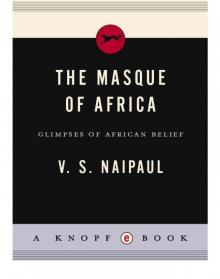 The Masque of Africa: Glimpses of African Belief
The Masque of Africa: Glimpses of African Belief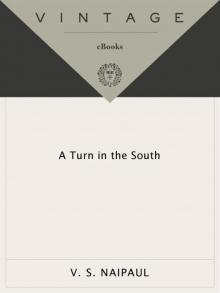 A Turn in the South
A Turn in the South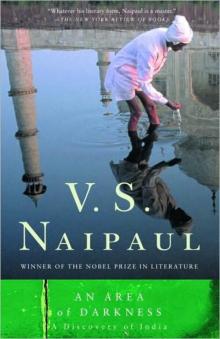 An Area of Darkness
An Area of Darkness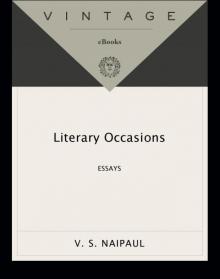 Literary Occasions: Essays
Literary Occasions: Essays A Way in the World
A Way in the World Among the Believers: An Islamic Journey
Among the Believers: An Islamic Journey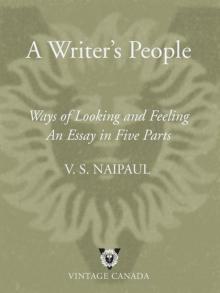 A Writer's People: Ways of Looking and Feeling
A Writer's People: Ways of Looking and Feeling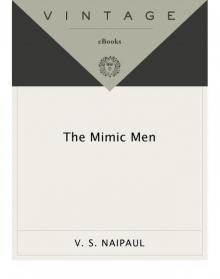 The Mimic Men: A Novel
The Mimic Men: A Novel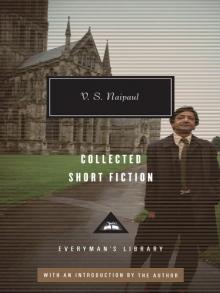 Collected Short Fiction
Collected Short Fiction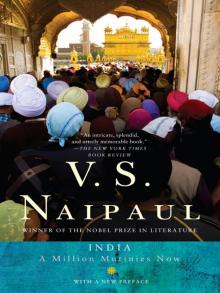 India: A Million Mutinies Now
India: A Million Mutinies Now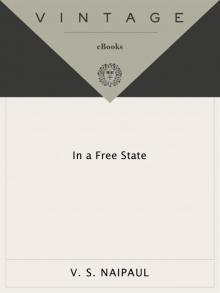 In a Free State
In a Free State Half a Life
Half a Life Beyond Belief: Islamic Excursions Among the Converted Peoples
Beyond Belief: Islamic Excursions Among the Converted Peoples Guerrillas
Guerrillas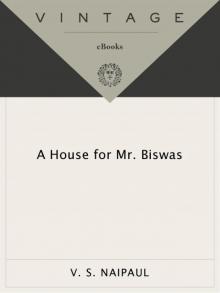 A House for Mr. Biswas
A House for Mr. Biswas The Writer and the World: Essays
The Writer and the World: Essays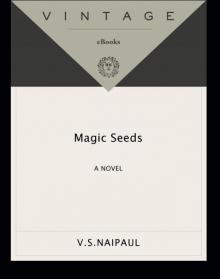 Magic Seeds
Magic Seeds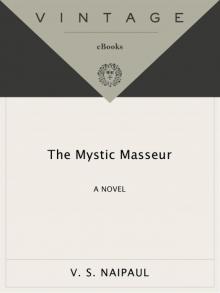 The Mystic Masseur
The Mystic Masseur Miguel Street
Miguel Street The Return of Eva Perón, With the Killings in Trinidad
The Return of Eva Perón, With the Killings in Trinidad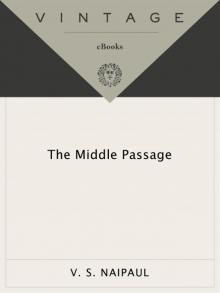 The Middle Passage
The Middle Passage A Bend in the River
A Bend in the River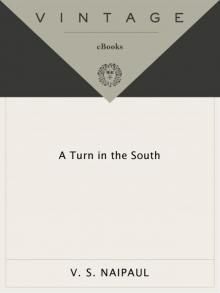 A Turn in the South (Vintage International)
A Turn in the South (Vintage International) Among the Believers
Among the Believers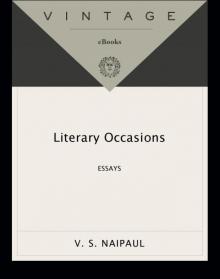 Literary Occasions
Literary Occasions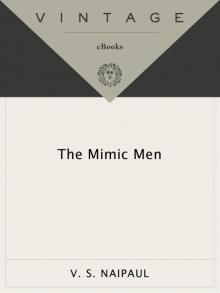 The Mimic Men
The Mimic Men The Writer and the World
The Writer and the World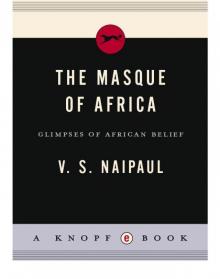 The Masque of Africa
The Masque of Africa